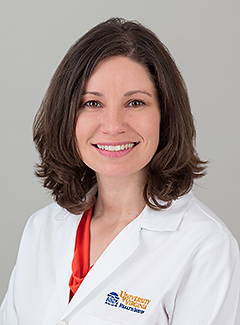Primary Care Track
Welcome and Mission Statement
Welcome to UVA’s Primary Care Track! The Track is designed to imbue a close-knit cadre of internal medicine residents with the knowledge, skills, and attitudes to become top-notch generalists. We see the Primary Care Track as a true springboard for a diverse array of careers, encompassing the clinical practice of general internal medicine, academic generalism, geriatrics, palliative care, and outpatient-oriented subspecialties. The Track offers a comprehensive training experience that prepares the trainee to be as comfortable in a rural office as in the ICU.

Maria Badaracco, MD: Primary Care Track Assistant Director
Established in 1977, the Track is one of the longest running programs of its type in the country, with some truly unique rotations such as our dedicated teaching practice in rural Orange, Virginia, just north of Charlottesville. But we don’t ‘rest on our laurels’ – we are constantly seeking to enhance the training experience to match the ever-changing demands on the modern internist. For example, we utilized our transition to a “3+1” schedule to craft a comprehensive and longitudinal “+1” ambulatory training experience and recently inaugurated a community-based Dermatology experience. In addition to the required rotations, Primary Care Track residents design their elective experiences to meet their individual training needs and interests.
Our passion for and commitment to mentoring each and every Track member assures that, by the end of three years, you will have the guidance you need to develop into the best physician you can be, and to embark on the next stage of your career whether it be clinical practice, academia, or fellowship training. We welcome the opportunity to review your application and hopefully meet with you in person.
For further information about the Primary Care Track, please write, call, or e-mail:
Rachel Kon, MD
Associate Professor of Medicine
Director, Primary Care Training Track
Maria C. Badaracco, MD
Assistant Professor of Medicine
Associate Director, Primary Care Training Track
Division of General, Geriatric, Palliative and Hospital Medicine
PO Box 800744, UVA Health System
Charlottesville, VA 22908-0744
434-982-3458
Distinctions Between the Primary Care and Categorical Tracks at UVA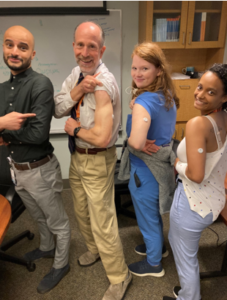
- Close mentoring of all Primary Care (PC) Track residents through all three years of training by the Track Director, Dr. Rachel Kon, and Associate Track Director, Dr. Maria Badaracco.
- All primary care residents are on the same outpatient firm at their core ambulatory training site (University Medical Associates – UMA) under the supervision of Dr. Kon for patient-resident-attending continuity and to foster camaraderie within the Track
- Primary Care Track residents have a second continuity experience at University Physicians–Charlottesville, a nine-physician UVA practice on our nearby Fontaine campus, to augment the university-based UMA experience with a more community-based, smaller practice experience. This experience is mentored by Dr. Badaracco.
- Community-based primary care rotations are offered in the three training years to provide broader exposure than the Categorical Track.
- There are more outpatient specialty elective rotations to tailor Primary Care Track training to an outpatient career path.
- The “+1” ambulatory weeks include training experiences tailored to PC track residents in addition to traditional internal medicine subspecialties, such as Dermatology and Sports Medicine.
- PGY-1 residents in the PC track have expanded clinical training in Geriatrics and Palliative care
- PC Track residents participate in our periodic “Hot Topics in Primary Care” discussions.
- PC Track residents have the opportunity to participate in mentored home visits.

2024 Hail and Farewell PC Track Dinner
The core primary care training experience is at University Medical Associates (UMA) and University Physicians – Charlottesville (UPC). UMA is a nationally recognized resident-faculty multidisciplinary practice serving not just the city of Charlottesville and surrounding counties but all of central Virginia and much of northern and southwestern Virginia. The clinic provides model care to a remarkably diverse patient population. Sixty percent of patients are medically indigent and, if uninsured, are eligible for free care and heavily discounted medications through the hospital pharmacy. The Primary Care Track residents are all on the same UMA firms under the mentorship of the Track Director, Dr. Kon. The UMA Clinic experience trains residents to manage the most biopsychosocial challenging patients as part of an interprofessional team that includes RN nurse care coordinators, social workers, pharmacy, LPNs, and patient care assistants.
All Primary Care Track residents have a second continuity experience during their +1 weeks at University Physicians-Charlottesville, led by Dr. Badaracco. With its nine UVA faculty internists, UPC offers a more intimate “office-like” rather than “clinic-like” environment for training. Its patient population ranges from the medically indigent to UVA department chairs. Residents are teamed with a faculty dyad for their own “mini-firm.” Primary Care Track residents can care for the full spectrum of patients encountered in primary care practice by seeing patients at UMA and UPC.
In addition to the clinical experiences offered to the Categorical residents, Primary Care Track residents participate in the unique core rotations described below.
The residency program has developed a model didactic curriculum for ambulatory internal medicine, including the following components:
PC Track Core Rotations:
PGY-1 Year
-
- Continuity Immersion Block: Training and patient care in both continuity clinics
- Women’s Health: UVA Gyn Clinic, Fluvanna Women’s Correctional CenterThree outpatient blocks
- Geriatrics-Palliative Care
PGY-2 & 3 Years
- 1-2 blocks at University Physicians at Orange
- 1 block at CVCHC rural primary care
- 1 block at Northridge Primary Care
- 4-6 sessions in UMA OBOT Clinic for substance use disorder treatment training
- Option of concentration area each +1 week: Women’s Health, HIV Care
Focus on Ambulatory Electives (+1 and blocks)
The “+1” Ambulatory Curriculum
The Wednesday morning of every +1 week is devoted to providing comprehensive education in ambulatory medicine and primary care. This is comprised of 3 components:
- 8:00-9:00 AM: Office-Based Medicine Curriculum – Based on the Yale Office-Based Medicine curriculum, this series covers two “bread and butter” primary care topics per morning in an interactive, case-based format, facilitated by general internal medicine faculty who integrate their own experience and expertise into the discussions.
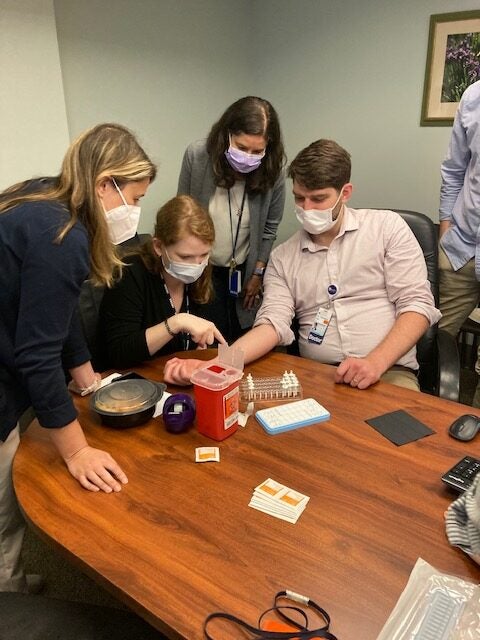 9:00-10:30 AM: Ambulatory Seminars – These interactive workshops and seminars provide residents with the knowledge and skills necessary to thrive as a generalist (see full list). They cover the gamut of generalist medicine, including such areas as:
9:00-10:30 AM: Ambulatory Seminars – These interactive workshops and seminars provide residents with the knowledge and skills necessary to thrive as a generalist (see full list). They cover the gamut of generalist medicine, including such areas as:
- Advanced Interviewing Skills
- Chronic Illness Care
- Medical Ethics & Professionalism
- Health Disparities
- Community-Partnered Medicine
- Pain Management
- Mental Health in Primary Care
- Substance Abuse
- Palliative Care
- Office MSK Procedures
- Health Policy & Health Economics
- Billing & Coding
- Transitions of Care
- 10:45-11:45 AM: Practice-Based Learning & Improvement (PBLI) Hour – Led by Dr. Jessica Dreicer, Assistant Professor of Medicine in General Medicine, this longitudinal session is devoted to teaching residents how to integrate principles of team-based quality improvement and patient safety into their professional lives. Residents identify quality issues in both their clinical and educational experience that are in need of improvement and work with their +1 co-residents, Dr. Dreicer, and other health professionals to design, implement, and evaluate QI interventions. Residents also complete individual QI projects on their own patient panels, based on data gleaned from our electronic medical record system.
Outpatient Topic Pearls
On Mondays and Tuesdays, faculty lead lectures on high yield outpatient topics prior to the start of the clinic day. Mondays feature subspecialty content, followed by primary care topics on Tuesday. The case-based and resident-led outpatient morning report occurs Friday mornings, facilitated by UMA faculty. This provides an opportunity to develop both outpatient knowledge base and small group teaching skills.
Outpatient Journal Club
An article demonstrating an important study design and addressing a pertinent outpatient topic is discussed once per week before UMA Clinic. Three residents per week review the article in detail with a faculty coach prior to the session. On Thursdays, the resident leads then guides the rest of the +1 group through reviewing the study design and methodology, analyzing the validity of the study and applicability to our patient population.
Hot Topics in Primary Care
Primary Care Track residents gather periodically, in a more informal setting, to discuss hot topics in Primary Care with Dr. Kon, other generalist faculty, and occasional expert faculty discussants. Recent articles serve as the springboard for discussion.

PC Track residents presenting at SGIM 2024
All Primary Care (PC) Track residents participate in a clinical research project during their residency training. With guidance from the Track Directors, residents are paired with a research mentor by the PGY-2 year and either choose a project from existing opportunities or develop a unique project based on personal interests. PC Track residents also have access to the same research opportunities offered to the Categorical residents, including funding for travel to professional meetings where they are presenting their research, internal grant funding opportunities, and participation in the PGY-2 research course.
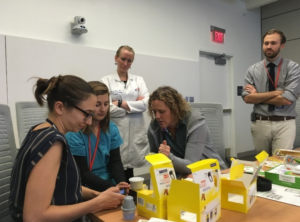
Examples of recent Primary Care Track resident projects include:
- Development of a computer-based smoking cessation aid
- Intervention to improve resident discharge summaries
- Multimodal intervention to improve colon cancer screening rates
- Doctor-family communication after the death of a loved one
- Impact of an automated reminder on osteoporosis screening
- Multi-site STI testing in an HIV-positive patient population
- Early-onset colorectal cancer – trends and survival
- Student perspectives on the etiologies of burnout during clinical years of medical school
Career Paths
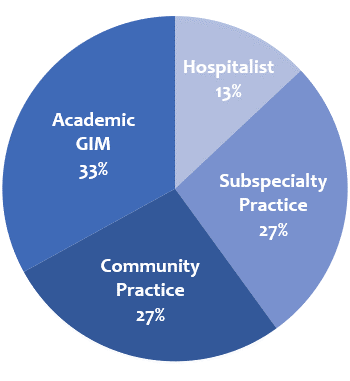 The Primary Care Track is intentionally designed to promote an eclectic array of career choices for its participants, from academia to private practice. Many residents remain in general internal medicine, whether purely outpatient, inpatient, or both. In contrast, others choose generalist-leaning subspecialties, particularly Geriatrics and Palliative Care, or outpatient-intensive subspecialties such as Endocrinology and Rheumatology.
The Primary Care Track is intentionally designed to promote an eclectic array of career choices for its participants, from academia to private practice. Many residents remain in general internal medicine, whether purely outpatient, inpatient, or both. In contrast, others choose generalist-leaning subspecialties, particularly Geriatrics and Palliative Care, or outpatient-intensive subspecialties such as Endocrinology and Rheumatology.
The chart at right depicts recent career choices of Primary Care Track graduates from 2018-2022.
Testimonials
Joining a primary care track was not on my radar when applying for residency. It was not until I interviewed at UVA that I decided to apply retrospectively for the PC track. After hearing about how it can prepare residents for primary care careers and all outpatient-focused career paths, I was sold. It has been one of my best decisions in a long time! The track provided a smaller cohort of co-residents and mentors to guide and support me through residency. I have learned valuable skills and now feel prepared for a career in an outpatient setting – whether that ultimately be community practice primary care or an outpatient subspecialty. This track exposed me to varying practice models and allowed for additional time in different clinics including women’s health, geriatrics/palliative care, and rural medicine. The PC track leadership, including Dr. Kon and Dr. Wolf, are wonderful role models and have inspired me as a physician during my training. I am so grateful for the experiences and training I have received in my time at UVA, and choosing to be a member of this community is a decision I would make over and over again!
Margo Tanner, MD, Former Chief Resident, Current Hospitalist, University of Virginia, Charlottesville, VA
The UVA PC track was foundational to my residency experience and preparation for my career in academic outpatient medicine. I have to start with the community of faculty and co-residents within the track, a rich place of friendship and like-minded people who encouraged and mentored me throughout training. Additionally, I found the specialized rotational experiences like women’s health, sports medicine, and rural medicine extremely helpful in preparing for the full range of primary care. However, the track is much more than the sum of its parts. What I remember most is the “Hot Topics in Primary Care” gatherings where we discussed the latest research in primary care, the time with my various mentors being challenged and encouraged, and, of course, the summer nights at Dr. Wolf’s house with all the PC track members and their families haling and fair-welling incoming and outgoing members. The UVA PC track made me who I am today as a physician, and I could not more highly recommend it to anyone who wants a robust, well-rounded experience and faithful community.
Reed Davis, MD, Core Faculty, Baptist Memorial Hospital, Oxford, MS
The main reason I chose UVA for residency is the Primary Care Track. The clinical opportunities provided and the mentorship from Dr. Wolf have molded me as a physician. What I love about the primary care track is it gives you ample opportunities to work in various settings including private practice, academic medicine, and underserved medicine. In addition, you can gain exposure to patient populations based on your interests. For example, I have a great interest in caring for the underserved Hispanic population and was able to pursue a rotation on the Eastern Shore of Virginia, working with a general practitioner and migrant farmers. Most importantly, you develop lifelong friends and have a primary care family and community at UVA. I am pursuing a career in academic primary care. While this was a goal of mine from the beginning of residency, there is no doubt that the training provided in the primary care track, the mentorship available through many faculty, and the opportunities within the track have left a lasting impact. It is the physicians I trained under whom I aspire to be like and who set the gold standard of a great physician. I cannot imagine training anywhere else.
Kennedy Wolfe, MD, Internist, Duke Health, Durham, NC
The primary care track was, hands-down, one of my best decisions and the highlight of my residency experience at UVA. From day one, I inherited a panel of patients and became their primary care physician. Thanks to the additional outpatient rotations and exceptional mentorship from Dr. Wolf, I became confident in practicing primary care by the time I graduated. I learned not only how to work up acute issues, manage chronic conditions, and provide preventive care but also important skills like joint injections, motivational interviewing, and shared decision-making. The primary care track does a great job balancing training in the hospital and a variety of clinic settings. The track also brings together an incredible group of residents, who become close as they navigate and discuss their primary care interests. I trace my career path today as an academic generalist and health policy researcher directly to my experience in the primary care track.
Sumit Agarwal, MD, MPH, Assistant Professor of Internal Medicine and Health Management and Policy, University of Michigan
During residency, I had multiple interests, ranging from outpatient primary care to critical care. I ultimately settled somewhere in the middle and chose an academic hospitalist position. The primary care track was a great way to see multiple aspects of internal medicine to help me make my decision, and Dr. Wolf served as an excellent mentor along the way. Thanks to the flexibility of the track, I feel well prepared for my career!
Kacie Saulters, MD, Associate Professor of Medicine, Internal Medicine Residency Program Director, University of Maryland Capital Region Health, Largo, MD

